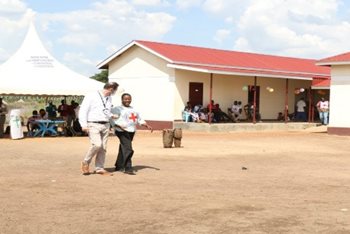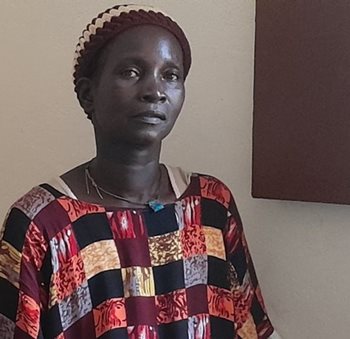Around the world, preventable maternal deaths, deaths among children under five years and neonatal deaths take place in areas experiencing conflict, displacement and natural disasters. According to the
World Health Organization South Sudan has some of the worst health outcomes in the world.

Between 2019 and 2021 the International Committee of the Red Cross (ICRC) and Canadian Red Cross piloted a program aimed at delivering lifesaving, preventative and curative health services to women and children affected by armed conflict. The Canadian Red Cross has supported similar programs in other countries before, but this was the first time in an area experiencing armed conflict.
In South Sudan, the project ran in partnership with the South Sudan Red Cross in Ngo Ku and Ngo Dakala in the Wau region. Chiefs and village elders were consulted to ensure they agreed with the approach and for the program being in their communities. Local community members were engaged and trained as volunteers to help facilitate the program.
The pilot program included building two primary health centres in the administrative regions of Ngo Ku and Ngo Dakala as well as training facility staff, supplementing their income and providing supplies to the centres during the project. In addition local volunteers were trained to educate their neighbours about preventative steps that can be taken to help improve reproductive, maternal, newborn, child and adolescent health - and where they can go for medical assistance.
Voices from the community
During the two years the program was piloted, 72 local volunteers visited an average of 1,700 households monthly, speaking about preventative health measures and referring people to the health centres when necessary. Here are the experiences of some of the people who were involved with, or supported by, the program:
 Perina
Perina, one of the community health volunteers in Ngovilo village received training from the South Sudan Red Cross about child health, safe motherhood, communicable diseases and first aid. In her volunteer role, she raises awareness around health issues and informs people in her area of how they can access health care. Some of the practices Perina helps advocate for include going to a health facility while sick, sleeping under mosquito nets, applying proper hand-washing techniques and accepting referrals.
Perina shares:
“I am much motivated as some of the people in my community accepted the health messages and do the practices. Most people are now aware of where to get health services, how to prevent diseases, immunization, and maternal services. The bicycle I received is helping in movement from house to house [while sharing] health awareness and sometimes referral to the health facility of Ngo Dakala. A solar torch (flashlight) helped me a week ago to take a pregnant mother to a health facility of Ngo Dakala for delivery and she was happy and appreciated the help after she delivered safely at the health centre.”
When
Joseph Andrea and his wife
Rozetha were preparing for the arrival of their fourteenth child, they had originally been instructed to go to a different hospital. It was night when Rozetha went into labour though, and they couldn’t afford to go there. Instead, they visited the health centre in Ngo-Dakala.
He shared how he waited a long time for his wife to deliver the baby and then he “heard the crying of the child and a person came and told me that my wife had delivered. I was happy and thanked God as well as the midwife for assisting and helping my wife to deliver a baby boy…” Afterward, Joseph says, “the midwife advised me of the family planning for my wife and I was able to learn more new things. I was happy to see how the midwife was taking care of my wife and the newborn boy. I will request [South Sudan Red Cross] to continue these services and keep up the spirit of service delivery to the community of this kind.”
Elizabeth Mangu and her three children receive health services in the Ngo Ku health centre. She delivered two of her children in the health centre and they receive vaccines and treatments at the centre. Elizabeth shares, “the staff at the health centre are kind, supportive and ready to help at any time when I and my family go there, and I also believe it is their nature for everyone. I sincerely appreciate Red Cross for taking good care of the health centre and helping the community of Ngo Ku”, Said Elizabeth.
Using key learnings to help future programs
The research compiled during the project showed that when working in conflict areas it is critical to engage communities, local leadership, volunteers, professionals, and patients throughout the life cycle of a program. Working to bridge inequities, negotiating safe passage for healthcare workers, and being mindful of local logistical and resource constraints are additional key elements to focus on. You can read the full peer-reviewed publication
here.
The Canadian Red Cross is working in partnership with the South Sudan Red Cross to transition ownership of the program to the South Sudan Health Authority. This will help ensure that people in the regions have long-term, improved access to community-based health-care services.